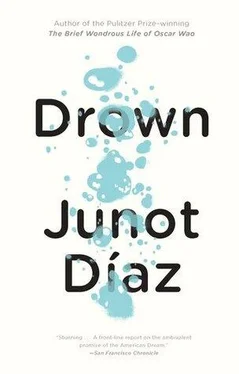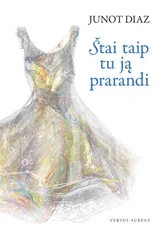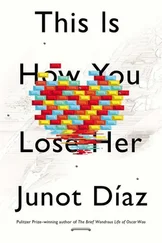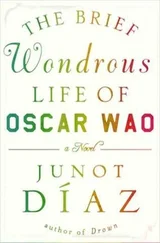Her tía Fresa held on to the first letters for a couple of weeks before turning them over to me, unopened. Just tell me if she’s OK or not, Fresa said. That’s about as much as I want to know.
She sounds OK to me.
Good. Don’t tell me anything else.
You should at least write her.
She put her hands on my shoulders and leaned down to my ear. You write her.
I wrote but I can’t remember what I said to her, except that the cops had come after her neighbor for stealing somebody’s car and that the gulls were shitting on everything. After the second letter I didn’t write anymore and it didn’t feel wrong or bad. I had a lot to keep me busy.
She came home in September and by then we had the Pathfinder in the parking lot and a new Zenith in the living room. Stay away from her, Cut said. Luck like that don’t get better.
No sweat, I said. You know I got the iron will.
People like her got addictive personalities. You don’t want to be catching that.
We stayed apart a whole weekend but on Monday I was coming home from Pathmark with a gallon of milk when I heard, Hey macho. I turned around and there she was, out with her dogs. She was wearing a black sweater, black stirrup pants and old black sneakers. I thought she’d come out messed up but she was just thinner and couldn’t keep still, her hands and face restless, like kids you have to watch.
How are you? I kept asking and she said, Just put your hands on me. We started to walk and the more we talked the faster we went.
Do this, she said. I want to feel your fingers.
She had mouth-sized bruises on her neck. Don’t worry about them. They ain’t contagious.
I can feel your bones.
She laughed. I can feel them too.
If I had half a brain I would have done what Cut told me to do. Dump her sorry ass. When I told him we were in love he laughed. I’m the King of Bullshit, he said, and you just hit me with some, my friend.
We found an empty apartment out near the highway, left the dogs and the milk outside. You know how it is when you get back with somebody you’ve loved. It felt better than it ever was, better than it ever could be again. After, she drew on the walls with her lipstick and her nail polish, stick men and stick women boning.
What was it like in there? I asked. Me and Cut drove past one night and it didn’t look good. We honked the horn for a long time, you know, thought maybe you’d hear.
She sat up and looked at me. It was a cold-ass stare.
We were just hoping.
I hit a couple of girls, she said. Stupid girls. That was a big mistake. The staff put me in the Quiet Room. Eleven days the first time. Fourteen after that. That’s the sort of shit that you can’t get used to, no matter who you are. She looked at her drawings. I made up this whole new life in there. You should have seen it. The two of us had kids, a big blue house, hobbies, the whole fucking thing.
She ran her nails over my side. A week from then she would be asking me again, begging actually, telling me all the good things we’d do and after a while I hit her and made the blood come out of her ear like a worm but right then, in that apartment, we seemed like we were normal folks. Like maybe everything was fine.
1.
I lived withouta father for the first nine years of my life. He was in the States, working, and the only way I knew him was through the photographs my moms kept in a plastic sandwich bag under her bed. Since our zinc roof leaked, almost everything we owned was water-stained: our clothes, Mami’s Bible, her makeup, whatever food we had, Abuelo’s tools, our cheap wooden furniture. It was only because of that plastic bag that any pictures of my father survived.
When I thought of Papi I thought of one shot specifically. Taken days before the U.S. invasion: 1965. I wasn’t even alive then; Mami had been pregnant with my first never-born brother and Abuelo could still see well enough to hold a job. You know the sort of photograph I’m talking about. Scalloped edges, mostly brown in color. On the back my moms’s cramped handwriting — the date, his name, even the street, one over from our house. He was dressed in his Guardia uniform, his tan cap at an angle on his shaved head, an unlit Constitución squeezed between his lips. His dark unsmiling eyes were my own.
I did not think of him often. He had left for Nueva York when I was four but since I couldn’t remember a single moment with him I excused him from all nine years of my life. On the days I had to imagine him — not often, since Mami didn’t much speak of him anymore — he was the soldier in the photo. He was a cloud of cigar smoke, the traces of which could still be found on the uniforms he’d left behind. He was pieces of my friends’ fathers, of the domino players on the corner, pieces of Mami and Abuelo. I didn’t know him at all. I didn’t know that he’d abandoned us. That this waiting for him was all a sham.
We lived south of the Cementerio Nacional in a wood-frame house with three rooms. We were poor. The only way we could have been poorer was to have lived in the campo or to have been Haitian immigrants, and Mami regularly offered these to us as brutal consolation.
At least you’re not in the campo. You’d eat rocks then.
We didn’t eat rocks but we didn’t eat meat or beans, either. Almost everything on our plates was boiled: boiled yuca, boiled platano, boiled guineo, maybe with a piece of cheese or a shred of bacalao. On the best days the cheese and the platanos were fried. When me and Rafa caught our annual case of worms it was only by skimping on our dinners that Mami could afford to purchase the Verminox. I can’t remember how many times I crouched over our latrine, my teeth clenched, watching long gray parasites slide out from between my legs.
At Mauricio Baez, our school, the kids didn’t bother us too much, even though we couldn’t afford the uniforms or proper mascotas. The uniforms Mami could do nothing about but with the mascotas she improvised, sewing together sheets of loose paper she had collected from her friends. We each had one pencil and if we lost that pencil, like I did once, we had to stay home from school until Mami could borrow another one for us. Our profesor had us share school books with some of the other kids and these kids wouldn’t look at us, tried to hold their breath when we were close to them.
Mami worked at Embajador Chocolate, putting in ten-, twelve-hour shifts for almost no money at all. She woke up every morning at seven and I got up with her because I could never sleep late, and while she drew the water out of our steel drum I brought the soap from the kitchen. There were always leaves and spiders in the water but Mami could draw a clean bucket better than anyone. She was a tiny woman and in the water closet she looked even smaller, her skin dark and her hair surprisingly straight and across her stomach and back the scars from the rocket attack she’d survived in 1965. None of the scars showed when she wore clothes, though if you embraced her you’d feel them hard under your wrist, against the soft part of your palm.
Abuelo was supposed to watch us while Mami was at work but usually he was visiting with his friends or out with his trap. A few years back, when the rat problem in the barrio had gotten out of hand (Those malditos were running off with kids, Abuelo told me), he had built himself a trap. A destroyer. He never charged anyone for using it, something Mami would have done; his only commission was that he be the one to arm the steel bar. I’ve seen this thing chop off fingers, he explained to the borrowers but in truth he just liked having something to do, a job of some kind. In our house alone Abuelo had killed a dozen rats and in one house on Tunti, forty of these motherfuckers were killed during a two-night massacre. He spent both nights with the Tunti people, resetting the trap and burning the blood and when he came back he was grinning and tired, his white hair everywhere, and my mother had said, You look like you’ve been out getting ass.
Читать дальше












